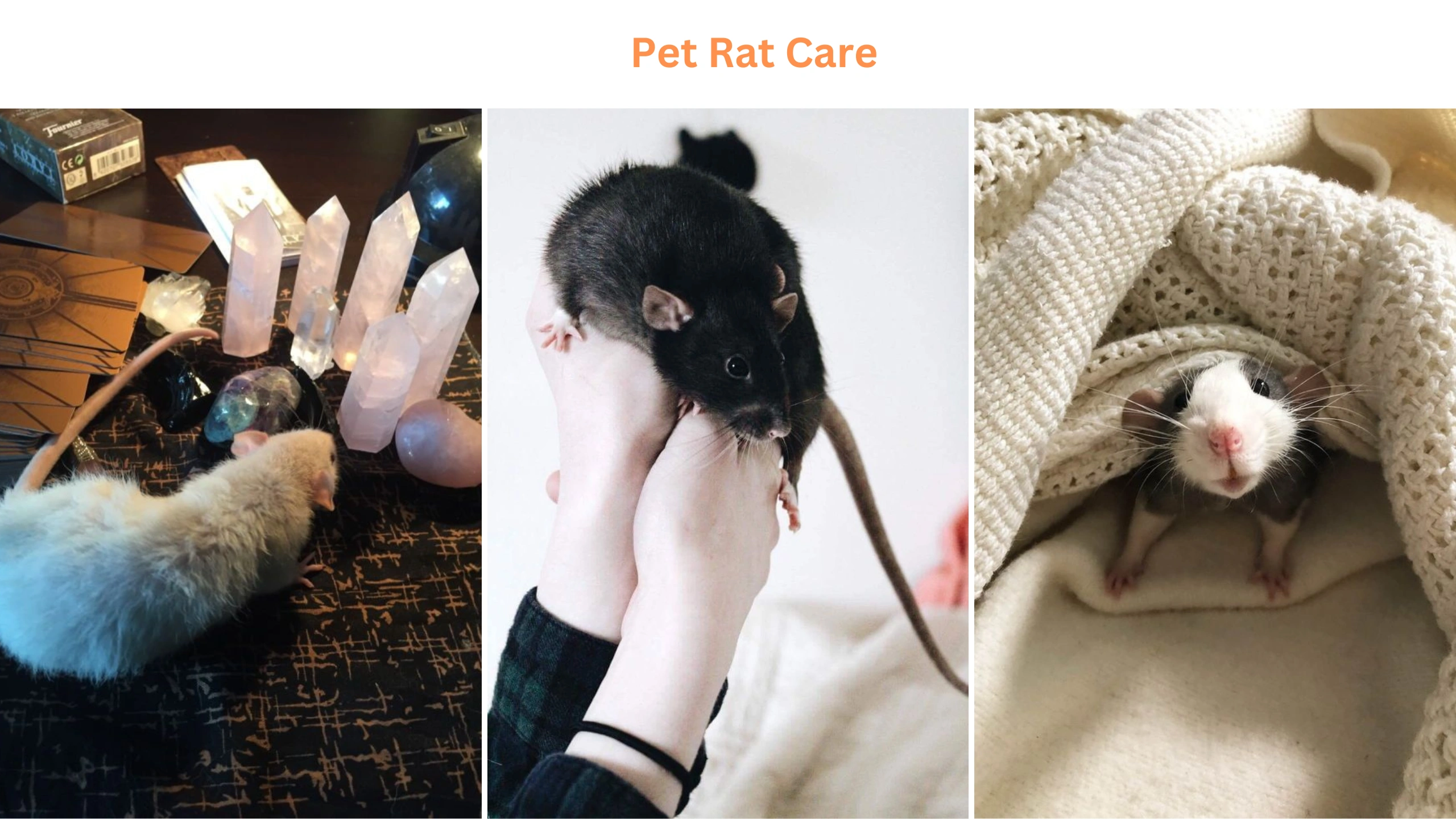Last Updated on February 6, 2024 by Aftab Tariq
Pet rat care involves providing the right care and attention to these intelligent and social companion animals. When considering the diet for pet rats, it’s crucial to focus on a well-balanced and nutritious menu.
Rats are awesome pets! They’re friendly and like being with others. It’s best to keep them in pairs. Boy and girl rats can be introduced early on, and they get along well. Female rats are especially good at living together. Rats have lots of babies – up to twenty in one litter! Pet rats usually live for about two to three years.
The enclosure or housing setup plays a pivotal role in ensuring their well-being, offering enough space for them to thrive. Socialization is key; rats enjoy human companionship, making it essential for owners to spend quality time interacting with their furry friends.
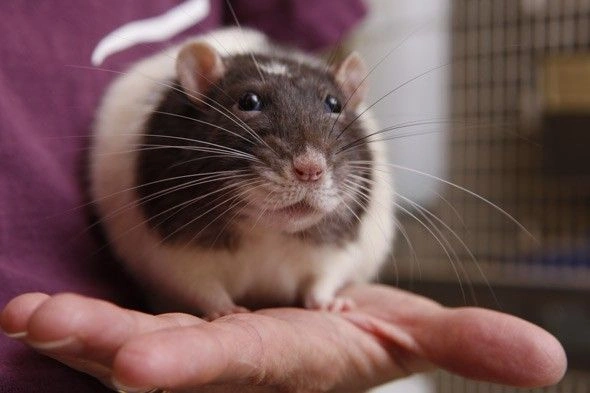
Educating the younger members about the proper care of rats and discouraging impulsive purchases from pet stores is important for families with kids. Creating an enriching environment with appropriate toys and structures enhances the overall pet rat care experience.
Providing a comfortable and safe space is not only beneficial for the rats’ physical health but also contributes to their mental stimulation. Pet rat care encompasses various aspects, from diet and housing to socialization and creating an ideal setup for these wonderful animals.
Rat Behavior and Temperament

Understanding rat behavior is crucial for owners to create a harmonious environment for their small, intelligent creatures. Different age groups of rats may exhibit varying temperaments, emphasizing the need for tailored approaches in handling and care.
Owners must know their rats’ specific needs and nuances, as these household pets thrive on positive interaction. When handling rats, gentle care with bare hands is advisable to prevent injuries or stress.
Like most males in the animal kingdom, male rats might display certain behavioral traits that differ from their female counterparts, necessitating a nuanced approach to their enclosure upkeep.
Creating pairs or even small groups of rats can foster a sense of companionship, benefiting their overall well-being. Paying attention to the weight of these pets is essential, as it can indicate their health status.
Additionally, understanding and responding to the vocalizations of rats contribute to effective communication between these delightful creatures and the people who care for them. Treats and positive reinforcement further enhance the bond between owners and their furry companions, creating a positive atmosphere where rats may comfortably rest on laps or shoulders.
Pet Rat Lifespan: The lifespan of pet rats, on average, ranges from 2 to 4 years, but some may live up to 7 years in captivity, which is significantly longer compared to their wild counterparts, who typically survive less than a year.
Size of Pet Rat Care
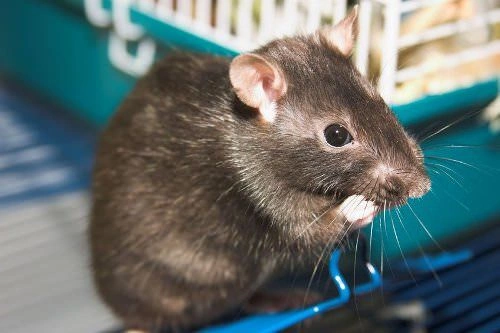
The size of pet rats averages between 14 and 18 inches in length, and tail included, showcasing their petite yet charming stature. In terms of weight, these adorable rodents tip the scales at approximately 0.5 to 1.5 pounds.
Notably, males tend to boast a larger physique than their female counterparts. This size range makes them compact and manageable, endearing them to owners seeking delightful companions in a conveniently petite package.
The Rat Housing Requirement
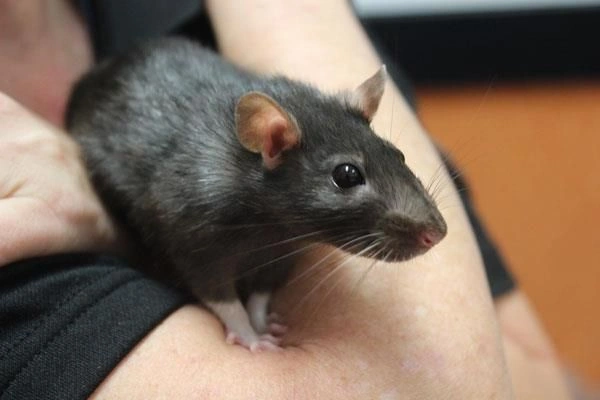
When considering Pet rat care, it’s essential to provide a spacious and comfortable enclosure that meets their unique needs. The recommended cage size for a pair of rats is around 2 feet by 2 feet by 2 feet, ensuring they have ample room for exercise and exploration.
The pet rat cage base should be equipped with suitable materials, such as a cozy animal nest or a well-placed nest box, creating a warm and secure spot for rats to rest. Introducing various forms of enrichment, such as chew toys and rat toys, promotes mental stimulation and prevents boredom, a crucial aspect of Pet rat care.
It’s crucial to be mindful of the air circulation within the enclosure and avoid exposing the rats to drafts that could compromise their well-being, an important consideration in Pet rat care. Placing the cage in a suitable location with access to natural sunlight but away from extreme temperatures is beneficial.
Additionally, providing a flat surface, like a flowerpot, for foot support contributes to their comfort in Pet rat care. A wire cage with secure spacing is advisable, ensuring the safety of these curious and agile animals while allowing for proper ventilation on every side.
Specific Substrate Needs to Rat
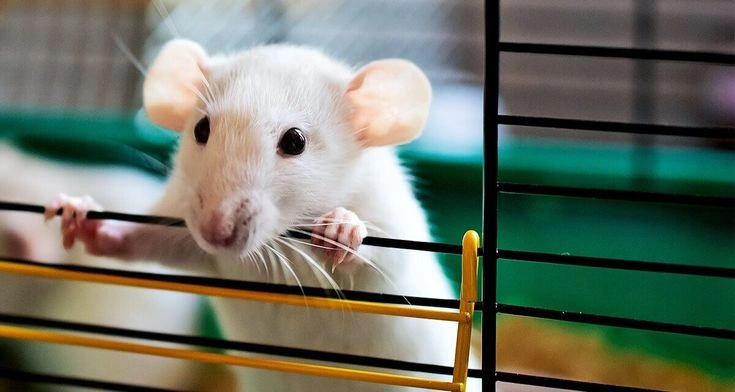
Addressing the substrate needs of rats is crucial for maintaining their well-being within an enclosure or cage. Opting for suitable bedding materials is essential, with choices like aspen, paper, or pellet bedding providing a comfortable and hygienic nest for rats.
It’s advisable to avoid using cedar or pine, as the oils from these materials can be harmful to their respiratory health. Choosing appropriate paper towels or napkins as part of the bedding at the bottom of the cage contributes to a clean and cozy environment for the rats.
Ensuring that surfaces within the enclosure are free from harsh soap or chemicals is essential to prevent adverse effects on their delicate skin.
Providing a suitable substrate enhances the overall comfort of rats and promotes a healthy and hygienic living space for these charming animals. Additionally, offering access to clean water within the enclosure is fundamental to meeting their hydration needs.
What Food and Drink Do Rats Eat?
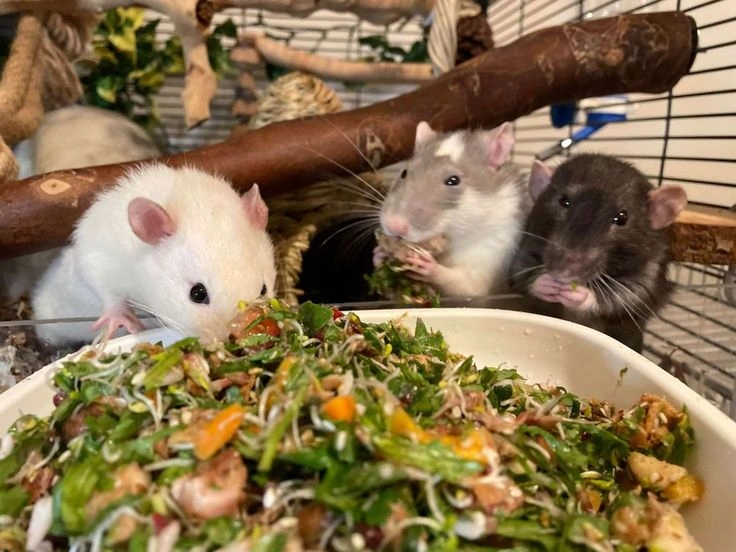
When considering what food and drink rats eat, it’s essential to provide a well-balanced and nutritious diet to meet the specific needs of these intelligent animals. Offering a variety of foods in suitable amounts helps prevent boredom and ensures a diverse nutritional intake.
Pet rat care involves including bread, cheese, fruits, meal worms, meat, nuts, pasta, rice, seeds, and vegetables in their food dishes, contributing to a wholesome diet. Additionally, incorporating high-quality pellets or pet rat food into their feeding instructions is crucial for meeting essential nutritional requirements.
Access to clean water is fundamental, whether through a water bottle or a water bowl within their enclosure. Regular check-ups with a vet can further guide owners in tailoring the diets of their pet rats to promote overall health and well-being.
Being mindful of the portion sizes and adjusting the rat diet according to their age and individual needs ensures these delightful animals have a happy and healthy life. In the realm of pet rat care, a thoughtful approach to nutrition and hydration is key to fostering their well-being.
Training Your Rat
Litter Training of Pet Rat
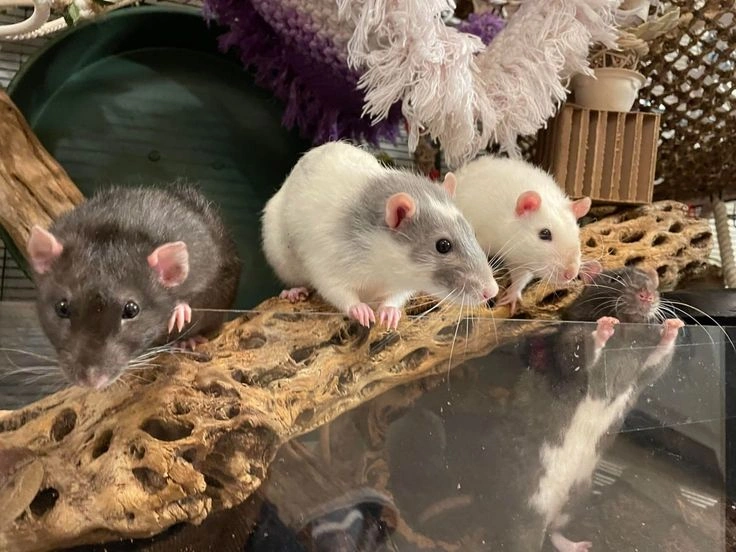
Litter training is essential to caring for pet rats, as it helps maintain a clean and hygienic environment for the animals and their owners. Introducing a designated litter box within the cage provides a specific spot for rats to attend to their bathroom needs, promoting efficient pet rat care.
Choosing the right kind of litter is crucial to ensure comfort and effectiveness in pet rat care. Placing multiple boxes strategically in different spots within the enclosure encourages rats to adopt the desired behavior.
Utilizing appropriate cage bedding with the litter box contributes to a neat and organized living space, a key aspect of pet rat care. Consistency in reinforcing the use of the box reinforces positive habits, creating a harmonious space where rats can comfortably take care of their needs without compromising the cleanliness of their living environment.
Typical Health Issues
Pet rats are usually quite resilient animals. However, they are more likely to suffer from certain health issues, such as the following:
- Disorders of the kidneys : Rats that have reached their senior years have an increased risk of developing renal illness as well as kidney and bladder stones.
Exercise of Pet Rat
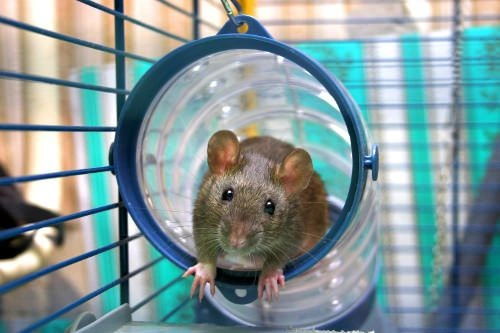
Ensuring the proper exercise of a pet rat is vital for their overall well-being, as these energetic and intelligent animals thrive on physical activity. Providing a variety of toys, such as rat toys, tunnels, ropes, and platforms within their enclosure, promotes mental stimulation and prevents boredom.
Pet rat care also involves introducing an exercise wheel, allowing rats to engage in regular physical activity, preventing lethargy and promoting a healthy lifestyle. Owners can enhance the well-being of their furry friends by incorporating furniture and hammocks, enabling them to climb and reach different surfaces, fulfilling their instincts.
Additionally, pet rat care emphasizes creating an enriched environment with ladders, tubes, and even mailing boxes for the rats to explore and gnaw on. It’s crucial to be mindful of safety to prevent injury, ensuring that all wires and cords are secured and that potential hazards are eliminated.
Regularly cleaning the cage is another aspect of pet rat care, helping control odor and providing a hygienic space for rats to play and exercise. By engaging their curious minds and encouraging them to explore various items, owners can create a stimulating and enjoyable environment for their beloved pet rats, ensuring their overall well-being.
Grooming of Pet Rat
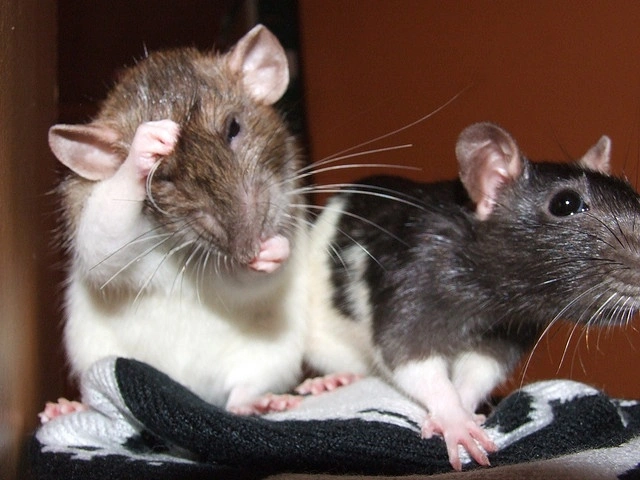
Grooming is essential to caring for pet rats, ensuring their well-being and maintaining a healthy coat. Regularly inspecting their fur for debris or dirt and addressing it gently is crucial.
While baths are generally not recommended for rats, a damp cloth can wipe away any impurities, keeping their skin clean. Paying attention to nails is also part of the grooming routine, and nail trims may be necessary to prevent animal discomfort.
Creating a comfortable and stress-free area for grooming at home is essential, allowing owners to attend to their rats’ grooming needs easily.
In case of any concerns or for more specialized care, consulting a vet with experience with small animals is advisable. Providing access to clean water for the rats contributes to their overall hygiene, ensuring they stay healthy and happy.
Costs of Pet Rat
Considering the costs of pet rats involves various elements, with an average initial expense ranging from $20 to $40 for acquiring the pet rat itself. Upkeep costs every month may include expenditures for bedding, chew toys, food, and other essential items to ensure their well-being.
Owners need to factor in potential veterinary care costs for regular check-ups and unforeseen emergencies that may arise.
Creating a suitable enclosure for the pet rat also contributes to the overall costs, as it should provide a safe and comfortable living space. Being mindful of these costs regularly is crucial for responsible pet ownership and ensuring the health and happiness of the pet rat.
Pros
- Ideal for limited spaces
- Less grooming, easy-to-clean cages
- Enjoy interaction, cuddling, form close relationships
- suitable for shorter-term commitments
Cons
- Prone to respiratory issues, needs vigilant care.
Purchasing or Adopting a Rat
When considering purchasing or adopting a rat, individuals have various options to acquire these delightful pet rats. The cost of acquiring a rat can range from, with options for adoption available through animal rescue groups or animal shelters where caring for these small animals is a priority.
Alternatively, individuals may choose to obtain a rat from reputable breeders who focus on the health and well-being of the animals. Whether through adoption or purchase, potential owners must inquire about the rat’s history, including information on its breeder, to ensure responsible breeding practices and a healthy start in life.
Checking the coat appearance and overall health of the rat is crucial, regardless of the chosen avenue for acquisition. While some individuals may prefer obtaining a rat from pet shops, others may find fulfillment in providing a home for needy rats through adoption.
Considering the ‘rats as pets pros and cons’ and weighing them against each option allows individuals to make an informed decision that aligns with their preferences and values as future rat owners
Reproduction and Breeding of Pet Rat
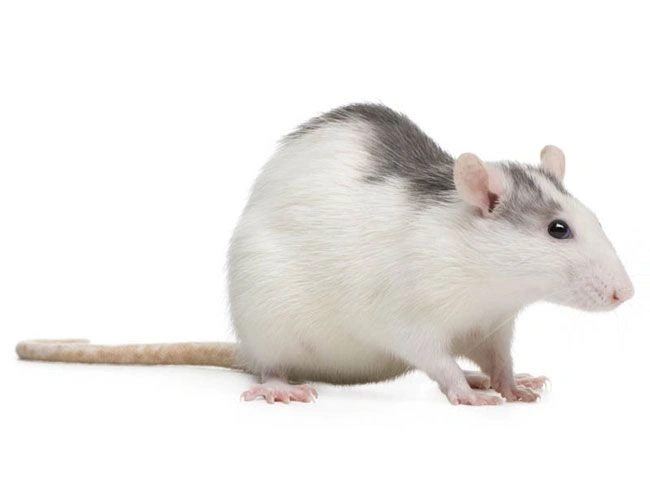
Reproducing and breeding pet rats require careful consideration and responsibility from pet owners. Engaging in breeding should be approached with thorough knowledge and awareness of the specific conditions necessary for the health and well-being of the animals involved.
Seeking guidance from experienced animal veterinarians is crucial to ensure that the breeding process aligns with ethical standards and prioritizes the welfare of the animals. Responsible breeders focus on selecting breeding pairs, emphasizing not only a variety of desirable traits but also the overall health of the rats.
Some individuals may support rat rescues and adoption rather than participate in breeding, contributing to the well-being of rats needing homes. When considering obtaining rats for breeding purposes, engaging with a reputable rat breeder or seller who prioritizes the ethical treatment and care of these intelligent and social animals is essential.
Ultimately, the decision to engage in rat breeding should be made with the utmost consideration for the welfare and future of the animals involved. If you are interested in purchasing pet rats for sale, please click here.
Frequently Asked Question
Are rats suitable as a pet for children?
Are rats hard to take care of?
Is it pleasant to hold a rat?
Do pet rats need shots?
Will pet rats cuddle?
Do pet rats smell?
Why Rats are Bad Pets?
Sources
- Viruses and bacteria: Rats are susceptible to various illnesses, including those of the respiratory system.
- Disorders of the kidneys : Rats that have reached their senior years have an increased risk of developing renal illness as well as kidney and bladder stones.
Exercise of Pet Rat

Ensuring the proper exercise of a pet rat is vital for their overall well-being, as these energetic and intelligent animals thrive on physical activity. Providing a variety of toys, such as rat toys, tunnels, ropes, and platforms within their enclosure, promotes mental stimulation and prevents boredom.
Pet rat care also involves introducing an exercise wheel, allowing rats to engage in regular physical activity, preventing lethargy and promoting a healthy lifestyle. Owners can enhance the well-being of their furry friends by incorporating furniture and hammocks, enabling them to climb and reach different surfaces, fulfilling their instincts.
Additionally, pet rat care emphasizes creating an enriched environment with ladders, tubes, and even mailing boxes for the rats to explore and gnaw on. It’s crucial to be mindful of safety to prevent injury, ensuring that all wires and cords are secured and that potential hazards are eliminated.
Regularly cleaning the cage is another aspect of pet rat care, helping control odor and providing a hygienic space for rats to play and exercise. By engaging their curious minds and encouraging them to explore various items, owners can create a stimulating and enjoyable environment for their beloved pet rats, ensuring their overall well-being.
Grooming of Pet Rat

Grooming is essential to caring for pet rats, ensuring their well-being and maintaining a healthy coat. Regularly inspecting their fur for debris or dirt and addressing it gently is crucial.
While baths are generally not recommended for rats, a damp cloth can wipe away any impurities, keeping their skin clean. Paying attention to nails is also part of the grooming routine, and nail trims may be necessary to prevent animal discomfort.
Creating a comfortable and stress-free area for grooming at home is essential, allowing owners to attend to their rats’ grooming needs easily.
In case of any concerns or for more specialized care, consulting a vet with experience with small animals is advisable. Providing access to clean water for the rats contributes to their overall hygiene, ensuring they stay healthy and happy.
Costs of Pet Rat
Considering the costs of pet rats involves various elements, with an average initial expense ranging from $20 to $40 for acquiring the pet rat itself. Upkeep costs every month may include expenditures for bedding, chew toys, food, and other essential items to ensure their well-being.
Owners need to factor in potential veterinary care costs for regular check-ups and unforeseen emergencies that may arise.
Creating a suitable enclosure for the pet rat also contributes to the overall costs, as it should provide a safe and comfortable living space. Being mindful of these costs regularly is crucial for responsible pet ownership and ensuring the health and happiness of the pet rat.
Pros
- Ideal for limited spaces
- Less grooming, easy-to-clean cages
- Enjoy interaction, cuddling, form close relationships
- suitable for shorter-term commitments
Cons
- Prone to respiratory issues, needs vigilant care.
Purchasing or Adopting a Rat
When considering purchasing or adopting a rat, individuals have various options to acquire these delightful pet rats. The cost of acquiring a rat can range from, with options for adoption available through animal rescue groups or animal shelters where caring for these small animals is a priority.
Alternatively, individuals may choose to obtain a rat from reputable breeders who focus on the health and well-being of the animals. Whether through adoption or purchase, potential owners must inquire about the rat’s history, including information on its breeder, to ensure responsible breeding practices and a healthy start in life.
Checking the coat appearance and overall health of the rat is crucial, regardless of the chosen avenue for acquisition. While some individuals may prefer obtaining a rat from pet shops, others may find fulfillment in providing a home for needy rats through adoption.
Considering the ‘rats as pets pros and cons’ and weighing them against each option allows individuals to make an informed decision that aligns with their preferences and values as future rat owners
Reproduction and Breeding of Pet Rat

Reproducing and breeding pet rats require careful consideration and responsibility from pet owners. Engaging in breeding should be approached with thorough knowledge and awareness of the specific conditions necessary for the health and well-being of the animals involved.
Seeking guidance from experienced animal veterinarians is crucial to ensure that the breeding process aligns with ethical standards and prioritizes the welfare of the animals. Responsible breeders focus on selecting breeding pairs, emphasizing not only a variety of desirable traits but also the overall health of the rats.
Some individuals may support rat rescues and adoption rather than participate in breeding, contributing to the well-being of rats needing homes. When considering obtaining rats for breeding purposes, engaging with a reputable rat breeder or seller who prioritizes the ethical treatment and care of these intelligent and social animals is essential.
Ultimately, the decision to engage in rat breeding should be made with the utmost consideration for the welfare and future of the animals involved. If you are interested in purchasing pet rats for sale, please click here.
Frequently Asked Question
Are rats suitable as a pet for children?
Are rats hard to take care of?
Is it pleasant to hold a rat?
Do pet rats need shots?
Will pet rats cuddle?
Do pet rats smell?
Why Rats are Bad Pets?
Sources
- Parasites: Rats are susceptible to contracting various parasites, including those that live in their intestines and skin, such as worms and lice.
- Viruses and bacteria: Rats are susceptible to various illnesses, including those of the respiratory system.
- Disorders of the kidneys : Rats that have reached their senior years have an increased risk of developing renal illness as well as kidney and bladder stones.
Exercise of Pet Rat

Ensuring the proper exercise of a pet rat is vital for their overall well-being, as these energetic and intelligent animals thrive on physical activity. Providing a variety of toys, such as rat toys, tunnels, ropes, and platforms within their enclosure, promotes mental stimulation and prevents boredom.
Pet rat care also involves introducing an exercise wheel, allowing rats to engage in regular physical activity, preventing lethargy and promoting a healthy lifestyle. Owners can enhance the well-being of their furry friends by incorporating furniture and hammocks, enabling them to climb and reach different surfaces, fulfilling their instincts.
Additionally, pet rat care emphasizes creating an enriched environment with ladders, tubes, and even mailing boxes for the rats to explore and gnaw on. It’s crucial to be mindful of safety to prevent injury, ensuring that all wires and cords are secured and that potential hazards are eliminated.
Regularly cleaning the cage is another aspect of pet rat care, helping control odor and providing a hygienic space for rats to play and exercise. By engaging their curious minds and encouraging them to explore various items, owners can create a stimulating and enjoyable environment for their beloved pet rats, ensuring their overall well-being.
Grooming of Pet Rat

Grooming is essential to caring for pet rats, ensuring their well-being and maintaining a healthy coat. Regularly inspecting their fur for debris or dirt and addressing it gently is crucial.
While baths are generally not recommended for rats, a damp cloth can wipe away any impurities, keeping their skin clean. Paying attention to nails is also part of the grooming routine, and nail trims may be necessary to prevent animal discomfort.
Creating a comfortable and stress-free area for grooming at home is essential, allowing owners to attend to their rats’ grooming needs easily.
In case of any concerns or for more specialized care, consulting a vet with experience with small animals is advisable. Providing access to clean water for the rats contributes to their overall hygiene, ensuring they stay healthy and happy.
Costs of Pet Rat
Considering the costs of pet rats involves various elements, with an average initial expense ranging from $20 to $40 for acquiring the pet rat itself. Upkeep costs every month may include expenditures for bedding, chew toys, food, and other essential items to ensure their well-being.
Owners need to factor in potential veterinary care costs for regular check-ups and unforeseen emergencies that may arise.
Creating a suitable enclosure for the pet rat also contributes to the overall costs, as it should provide a safe and comfortable living space. Being mindful of these costs regularly is crucial for responsible pet ownership and ensuring the health and happiness of the pet rat.
Pros
- Ideal for limited spaces
- Less grooming, easy-to-clean cages
- Enjoy interaction, cuddling, form close relationships
- suitable for shorter-term commitments
Cons
- Prone to respiratory issues, needs vigilant care.
Purchasing or Adopting a Rat
When considering purchasing or adopting a rat, individuals have various options to acquire these delightful pet rats. The cost of acquiring a rat can range from, with options for adoption available through animal rescue groups or animal shelters where caring for these small animals is a priority.
Alternatively, individuals may choose to obtain a rat from reputable breeders who focus on the health and well-being of the animals. Whether through adoption or purchase, potential owners must inquire about the rat’s history, including information on its breeder, to ensure responsible breeding practices and a healthy start in life.
Checking the coat appearance and overall health of the rat is crucial, regardless of the chosen avenue for acquisition. While some individuals may prefer obtaining a rat from pet shops, others may find fulfillment in providing a home for needy rats through adoption.
Considering the ‘rats as pets pros and cons’ and weighing them against each option allows individuals to make an informed decision that aligns with their preferences and values as future rat owners
Reproduction and Breeding of Pet Rat

Reproducing and breeding pet rats require careful consideration and responsibility from pet owners. Engaging in breeding should be approached with thorough knowledge and awareness of the specific conditions necessary for the health and well-being of the animals involved.
Seeking guidance from experienced animal veterinarians is crucial to ensure that the breeding process aligns with ethical standards and prioritizes the welfare of the animals. Responsible breeders focus on selecting breeding pairs, emphasizing not only a variety of desirable traits but also the overall health of the rats.
Some individuals may support rat rescues and adoption rather than participate in breeding, contributing to the well-being of rats needing homes. When considering obtaining rats for breeding purposes, engaging with a reputable rat breeder or seller who prioritizes the ethical treatment and care of these intelligent and social animals is essential.
Ultimately, the decision to engage in rat breeding should be made with the utmost consideration for the welfare and future of the animals involved. If you are interested in purchasing pet rats for sale, please click here.
Frequently Asked Question
Are rats suitable as a pet for children?
Are rats hard to take care of?
Is it pleasant to hold a rat?
Do pet rats need shots?
Will pet rats cuddle?
Do pet rats smell?
Why Rats are Bad Pets?
Sources
- Cancer : Both benign and malignant tumors may develop in rats rather easily.
- Parasites: Rats are susceptible to contracting various parasites, including those that live in their intestines and skin, such as worms and lice.
- Viruses and bacteria: Rats are susceptible to various illnesses, including those of the respiratory system.
- Disorders of the kidneys : Rats that have reached their senior years have an increased risk of developing renal illness as well as kidney and bladder stones.
Exercise of Pet Rat

Ensuring the proper exercise of a pet rat is vital for their overall well-being, as these energetic and intelligent animals thrive on physical activity. Providing a variety of toys, such as rat toys, tunnels, ropes, and platforms within their enclosure, promotes mental stimulation and prevents boredom.
Pet rat care also involves introducing an exercise wheel, allowing rats to engage in regular physical activity, preventing lethargy and promoting a healthy lifestyle. Owners can enhance the well-being of their furry friends by incorporating furniture and hammocks, enabling them to climb and reach different surfaces, fulfilling their instincts.
Additionally, pet rat care emphasizes creating an enriched environment with ladders, tubes, and even mailing boxes for the rats to explore and gnaw on. It’s crucial to be mindful of safety to prevent injury, ensuring that all wires and cords are secured and that potential hazards are eliminated.
Regularly cleaning the cage is another aspect of pet rat care, helping control odor and providing a hygienic space for rats to play and exercise. By engaging their curious minds and encouraging them to explore various items, owners can create a stimulating and enjoyable environment for their beloved pet rats, ensuring their overall well-being.
Grooming of Pet Rat

Grooming is essential to caring for pet rats, ensuring their well-being and maintaining a healthy coat. Regularly inspecting their fur for debris or dirt and addressing it gently is crucial.
While baths are generally not recommended for rats, a damp cloth can wipe away any impurities, keeping their skin clean. Paying attention to nails is also part of the grooming routine, and nail trims may be necessary to prevent animal discomfort.
Creating a comfortable and stress-free area for grooming at home is essential, allowing owners to attend to their rats’ grooming needs easily.
In case of any concerns or for more specialized care, consulting a vet with experience with small animals is advisable. Providing access to clean water for the rats contributes to their overall hygiene, ensuring they stay healthy and happy.
Costs of Pet Rat
Considering the costs of pet rats involves various elements, with an average initial expense ranging from $20 to $40 for acquiring the pet rat itself. Upkeep costs every month may include expenditures for bedding, chew toys, food, and other essential items to ensure their well-being.
Owners need to factor in potential veterinary care costs for regular check-ups and unforeseen emergencies that may arise.
Creating a suitable enclosure for the pet rat also contributes to the overall costs, as it should provide a safe and comfortable living space. Being mindful of these costs regularly is crucial for responsible pet ownership and ensuring the health and happiness of the pet rat.
Pros
- Ideal for limited spaces
- Less grooming, easy-to-clean cages
- Enjoy interaction, cuddling, form close relationships
- suitable for shorter-term commitments
Cons
- Prone to respiratory issues, needs vigilant care.
Purchasing or Adopting a Rat
When considering purchasing or adopting a rat, individuals have various options to acquire these delightful pet rats. The cost of acquiring a rat can range from, with options for adoption available through animal rescue groups or animal shelters where caring for these small animals is a priority.
Alternatively, individuals may choose to obtain a rat from reputable breeders who focus on the health and well-being of the animals. Whether through adoption or purchase, potential owners must inquire about the rat’s history, including information on its breeder, to ensure responsible breeding practices and a healthy start in life.
Checking the coat appearance and overall health of the rat is crucial, regardless of the chosen avenue for acquisition. While some individuals may prefer obtaining a rat from pet shops, others may find fulfillment in providing a home for needy rats through adoption.
Considering the ‘rats as pets pros and cons’ and weighing them against each option allows individuals to make an informed decision that aligns with their preferences and values as future rat owners
Reproduction and Breeding of Pet Rat

Reproducing and breeding pet rats require careful consideration and responsibility from pet owners. Engaging in breeding should be approached with thorough knowledge and awareness of the specific conditions necessary for the health and well-being of the animals involved.
Seeking guidance from experienced animal veterinarians is crucial to ensure that the breeding process aligns with ethical standards and prioritizes the welfare of the animals. Responsible breeders focus on selecting breeding pairs, emphasizing not only a variety of desirable traits but also the overall health of the rats.
Some individuals may support rat rescues and adoption rather than participate in breeding, contributing to the well-being of rats needing homes. When considering obtaining rats for breeding purposes, engaging with a reputable rat breeder or seller who prioritizes the ethical treatment and care of these intelligent and social animals is essential.
Ultimately, the decision to engage in rat breeding should be made with the utmost consideration for the welfare and future of the animals involved. If you are interested in purchasing pet rats for sale, please click here.
Frequently Asked Question
Are rats suitable as a pet for children?
Are rats hard to take care of?
Is it pleasant to hold a rat?
Do pet rats need shots?
Will pet rats cuddle?
Do pet rats smell?
Why Rats are Bad Pets?
Sources
I am a dedicated content writer with more than five years of experience, particularly skilled in the art of storytelling. My writing journey commenced during my college years, where I pursued journalism and unearthed my talent for creating captivating narratives.

